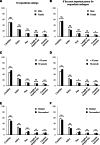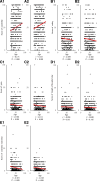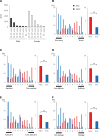Questionnaire to Survey Cosmetic Outcomes in Laparoscopic Surgery for Colorectal Cancer
- PMID: 39310360
- PMCID: PMC11415132
- DOI: 10.1097/AS9.0000000000000443
Questionnaire to Survey Cosmetic Outcomes in Laparoscopic Surgery for Colorectal Cancer
Abstract
Background and objectives: There has been a steady increase in the use of minimally invasive surgery, including conventional multiport laparoscopic surgery (MLS) and single-site laparoscopic surgery (SLS) for colorectal cancer. We aimed to evaluate how important the cosmetic outcome, one of the advantages of SLS, is to patients and whether SLS reflects social needs.
Methods: We used a web-based questionnaire to survey nonmedical and medical workers for what factors were considered on the assumption that respondents undergo colorectal cancer surgery and that the most important person for them undergoes. Five items (curability, safety, pain, length of hospital stay, and cosmetic outcomes) were compared. After paired photographs before and after SLS and MLS were shown, perceptions of body image and cosmesis were assessed using a visual analog scale.
Results: This study included a total of 1352 respondents (990 nonmedical and 362 medical). Curability had the highest score (49.9-53.7 points), followed by safety (23.8-24.7 points). The scores for cosmetic outcomes (6.2-7.1 points) were almost equal to those of the length of hospital stay (6.2-7.1 points), which was associated with medical costs and pain (10.0-11.1 points), one of the main reasons for fear of surgery. Participants who were female, younger, and in the nonmedical group placed great importance on cosmetic outcomes. For all questions regarding body image and cosmesis, SLS had superior scores compared with MLS.
Conclusions: Understandably, curability, and safety were most important in colorectal cancer surgery. However, medical workers should consider cosmetic outcomes, even in malignant cases.
Keywords: colorectal cancer; conventional multiport laparoscopic surgery; cosmetic outcomes; single-site laparoscopic surgery.
Copyright © 2024 The Author(s). Published by Wolters Kluwer Health, Inc.
Figures




Similar articles
-
Single-incision laparoscopic splenectomy versus conventional multiport laparoscopic splenectomy: a retrospective comparison of outcomes.Surg Innov. 2013 Feb;20(1):40-5. doi: 10.1177/1553350612443898. Epub 2012 Apr 11. Surg Innov. 2013. PMID: 22495244
-
Single-incision versus conventional multiport laparoscopic surgery for colorectal cancer: a meta-analysis of randomized controlled trials and propensity-score matched studies.Int J Colorectal Dis. 2021 Jul;36(7):1407-1419. doi: 10.1007/s00384-021-03918-6. Epub 2021 Apr 7. Int J Colorectal Dis. 2021. PMID: 33829313
-
Comparison of laparoendoscopic single-site (LESS) surgery and conventional multiport laparoscopic (CMPL) surgery for hysterectomy: long-term outcomes of abdominal incisional scar.J Obstet Gynaecol. 2020 Feb;40(2):217-221. doi: 10.1080/01443615.2019.1606183. Epub 2019 Jul 26. J Obstet Gynaecol. 2020. PMID: 31347412
-
Meta-analysis of single-port versus conventional laparoscopic cholecystectomy comparing body image and cosmesis.Br J Surg. 2017 Aug;104(9):1141-1159. doi: 10.1002/bjs.10574. Epub 2017 Jun 1. Br J Surg. 2017. PMID: 28569406 Review.
-
Meta-analysis of Laparoendoscopic Single-site and Vaginal Natural Orifice Transluminal Endoscopic Hysterectomy Compared with Multiport Hysterectomy: Real Benefits or Diminishing Returns?J Minim Invasive Gynecol. 2021 Mar;28(3):698-709.e1. doi: 10.1016/j.jmig.2020.11.029. Epub 2020 Dec 17. J Minim Invasive Gynecol. 2021. PMID: 33346073
References
-
- Yamamoto S, Inomata M, Katayama H, et al. ; Japan Clinical Oncology Group Colorectal Cancer Study Group. Short-term surgical outcomes from a randomized controlled trial to evaluate laparoscopic and open D3 dissection for stage II/III colon cancer: Japan Clinical Oncology Group Study JCOG 0404. Ann Surg. 2014;260:23–30. - PubMed
-
- Wang CL, Qu G, Xu HW. The short- and long-term outcomes of laparoscopic versus open surgery for colorectal cancer: a meta-analysis. Int J Colorectal Dis. 2014;29:309–320. - PubMed
-
- Theophilus M, Platell C, Spilsbury K. Long-term survival following laparoscopic and open colectomy for colon cancer: a meta-analysis of randomized controlled trials. Colorectal Dis. 2014;16:O75–O81. - PubMed
-
- Green BL, Marshall HC, Collinson F, et al. . Long-term follow-up of the Medical Research Council CLASICC trial of conventional versus laparoscopically assisted resection in colorectal cancer. Br J Surg. 2013;100:75–82. - PubMed
LinkOut - more resources
Full Text Sources

